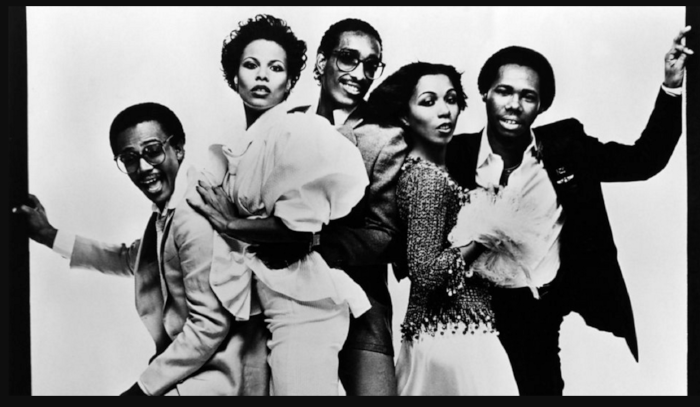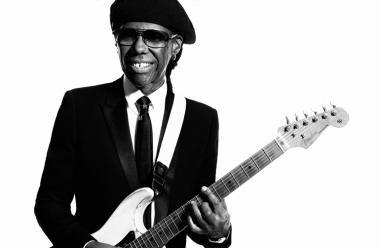Nile Rodgers is one of those people you’d just like to thank: for Chic and Sister Sledge; for combining uptown style with downtown rhythms; for swooning strings and relentless ‘chucking’ guitar patterns; for ‘High Society,’ ‘My Forbidden Lover’ and ‘Get Lucky’; for the renaissance of Diana Ross; for the pause in ‘I Want Your Love’; for the chassis to ‘Rapper’s Delight’; for getting ‘lost in music, caught in a trap, no turning back’; for sheer rapture on the dance floor; for the ‘Good Times.’
‘If you left it up to me,
Every day would be Saturday.
People party through the week,
They’d be laughing.
I just can’t wait ‘til Saturday.
I just can’t wait ‘til Saturday.’
‘Saturday,’ Norma Jean (Bernard Edwards, Nile Rodgers, Bobby Carter)
Rodgers’ excellent autobiography ‘Le Freak’ is a rollercoaster ride of joy and pain, of triumph over adversity; a story told with wisdom, warmth and good humour. He grew up amongst bohemians and drug users in New York and LA. He suffered insomnia and chronic asthma. His early life involved encounters with Thelonius Monk, Timothy Leary and assorted Black Panthers; with Andy Warhol, Jimi Hendrix and Sesame Street. Eventually he met Bernard Edwards, formed Chic, and together they created the blueprint for sophisticated modern dance music. He went on to confer his distinctive production dazzle on the likes of David Bowie, Duran Duran and Madonna. This is a life fully lived.
Rodgers’ natural musical gift was first expressed through the clarinet he was taught at school. At 15 he convinced his mother and stepfather to buy him a guitar. He set about learning his new instrument from his clarinet etudes and a Beatles songbook. But, however hard he tried, he couldn’t coax anything approaching a proper melody from the guitar. How frustrating! One day his stepfather came across him practising and took the instrument in his hands: ’Wow, this is way out of tune.’ The young Nile hadn’t been aware of the need to tune the guitar.

‘Sir Edmond Hillary, reaching the summit of Mount Everest, must have felt something similar to what I felt at that moment. This was more blissful than anything I’d ever experienced. I played the next chord and it sounded like the right chord in the progression. I started the song again. With utter confidence I sang, ‘I read the news today, oh boy,’ then strummed an E minor and dropped to the seventh, ‘About a lucky man who made the grade.’ There are no words to accurately describe what this felt like.’
I was touched by this story. It spoke of joy unconfined, pure youthful creative liberation.
In a completely different context, Nile Rodgers’ out-of-tune guitar made me wonder about the commercial world. How often does a business have the right strings, on the right instrument, being plucked in exactly the right way, without producing any meaningful music? How often is a business ill at ease with itself, out of tune, with no sense of where the problem lies?
We may think of leaders nowadays as people who hire and fire, replace and reconfigure. But the truest test of good leaders is their ability to realise the potential of the talent already at their disposal. Can they allocate roles and responsibilities, tasks and objectives in such a way as to create a genuine sense of collective purpose? Can they galvanise disparate skills and personalities into a supportive, happy team? Can they motivate them, direct them, inspire them to play in tune, to sing in harmony?
‘Everyone can see we’re together,
As we walk on by.
And we fly just like birds of a feather
I won’t tell no lie.
We are family
I got all my sisters with me.’
‘We Are Family,’ Sister Sledge (Bernard Edwards, Nile Rodgers)
Great leaders set the rhythm of a business, get it dancing in step, as one. I’ve witnessed this kind of leadership. It’s a rare instinctive thing, a wonder to behold. It requires humility and empathy; charisma and vision, in equal measure. It requires a positive engagement with people, life and circumstances.
These are qualities that I’m sure Rodgers himself has in abundance. At the start of his book, he quotes an old saying:
‘Life isn’t about surviving the storm; it’s about learning how to dance in the rain.’
This piece first appeared on Jim Carroll's blog here.
Newsletter
Enjoy this? Get more.
Our monthly newsletter, The Edit, curates the very best of our latest content including articles, podcasts, video.
Become a member
Not a member yet?
Now it's time for you and your team to get involved. Get access to world-class events, exclusive publications, professional development, partner discounts and the chance to grow your network.




